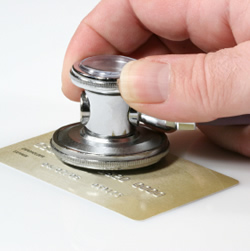
Is your credit affecting your loan approval? Is your interest rate on your mortgage going to be affected by your credit score? If you have not seen your credit score in a while, we are happy to inform you of your credit information as part of our standard loan application process. Often, we are able to get you a mortgage when your credit is great, good or even “kinda bad…”
Managing your credit score is very important when you are planning to obtain new credit in the future.
How a credit score is measured:
Payment History – About 35% of your credit score
- Pay your bills on time.
Delinquent payments, even if only a few days late, and collections can have a major negative impact on your FICO score.
- If you have missed payments, get current and stay current.
The longer you pay your bills on time after being late, the more your FICO score should increase. Older credit problems count for less, so poor credit performance won’t haunt you forever. The impact of past credit problems on your FICO score fades as time passes and as recent good payment patterns show up on your credit report. And good FICO scores weigh any credit problems against the positive information that says you’re managing your credit well.
- Be aware that paying off a collection account will not remove it from your credit report.
It will stay on your report for seven years.
- If you are having trouble making ends meet, contact your creditors.
This won’t rebuild your credit score immediately, but if you can begin to manage your credit and pay on time, your score should increase over time. And seeking assistance from a credit counseling service will not hurt your FICO score.
Amounts Owed – About 30% of your credit score
- Keep balances low on credit cards and other “revolving credit”.
High outstanding debt can affect a credit score.
- Pay off debt rather than moving it around.
The most effective way to improve your credit score in this area is by paying down your revolving (credit cards) debt. In fact, owing the same amount but having fewer open accounts may lower your score.
- Don’t close unused credit cards as a short-term strategy to raise your score.
- Don’t open a number of new credit cards that you don’t need, just to increase your available credit.
This approach could backfire and actually lower your credit score.
Length of Credit History
- If you have been managing credit for a short time, don’t open a lot of new accounts too rapidly.
New accounts will lower your average account age, which will have a larger effect on your score if you don’t have a lot of other credit information.
New Credit
- Do your rate shopping for a given loan within a focused period of time.
FICO scores distinguish between a search for a single loan and a search for many new credit lines, in part by the length of time over which inquiries occur.
- Re-establish your credit history if you have had problems. Opening new accounts responsibly and paying them off on time will raise your credit score in the long term.
- Note that it’s OK to request and check your own credit report. This won’t affect your score, as long as you order your credit report directly from the credit reporting agency or through an organization authorized to provide credit reports to consumers.
Types of Credit Use
- Apply for and open new credit accounts only as needed.
Don’t open accounts just to have a better credit mix – it probably won’t raise your credit score.
- Have credit cards – but manage them responsibly.
In general, having credit cards and installment loans (and paying timely payments) will rebuild your credit score. Someone with no credit cards, for example, is viewed to be higher risk than someone who has managed credit cards responsibly.
- Note that closing an account doesn’t make it go away. A closed account will still show up on your credit report, and may be considered by the score.
CREDIT REPAIR OPTIONS – If you want assistance.
Our team has some great knowledge on general Credit Repair items, however, sometimes it goes beyond our expertise and we recommend using a 3rd party that specializes in Credit Repair.
HIGHER SCORE – higherscore.credit
Higher Score is giving the Credit Improvement Space a refreshing upgrade. Their team assists with:
- Credit Analysis
- Customized Solutions
- Error Resolution
- Debt Management
- Building Credit
- Credit Management
- Rapid Rescore
- Continuing Education
Fill out the form on the right to be contacted by their team right away!
You can always do some of the work yourself. If the contact with your creditor doesn’t work, you’ll need to notify each credit bureau that has reported the information (usually all three). The three credit bureaus to contact are:
Equifax
P.O. Box 740241
Atlanta GA 30374-0241
(800) 685-1111
(770) 612-3200
http://www.equifax.com/consumer/consumer.html
Experian
P.O. Box 949
Allen TX 75013-0949
(888) 397-3742
http://www.experian.com
Trans Union Corporation
Consumer Disclosure Center
P.O. Box 390
Springfield PA 19064-0390
(800) 916-8800
(800) 682-7654
(714) 680-7292
http://www.transunion.com
——————-
You’ll need to send them each a letter.
If you take this process on, there will be more action items needed. Ask for help from a professional, or follow a plan from a website like www.iplace.com .
The process can be difficult, but your credit usually won’t begin to improve until you “reverse course” and start taking action.
Let us know if we can help!





